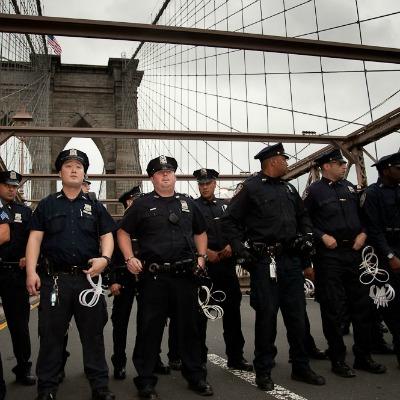BOB GARFIELD: On October 1st 2011, an Occupy Wall Street march ended on the roadway of the Brooklyn Bridge, with hundreds of protesters blocked on both sides by police and eventually arrested.
[SOUND OF PROTESTORS]
Malcolm Harris was one of those protesters, later charged with disorderly conduct. In his defense, Harris claims that the New York police corralled him onto the roadway, but the prosecution alleges that he not only blocked the road of his own volition, he planned as much well before the fact. To prove its contention of premeditation, the prosecution subpoenaed from Twitter the records of three months’ worth of tweets Harris had since deleted. Harris, and eventually Twitter itself, sought to quash that subpoena on First and Fourth Amendment grounds, but on Monday, Manhattan Judge Matthew Sciarrino ordered Twitter to comply with the subpoena. In his decision, Sciarrino wrote “If you post a tweet, just like if you scream it out the window, there is no reasonable expectation of privacy.”
So why would Harris and Twitter fight to protect tweets that were public anyway? First of all, according to Twitter, the Harris subpoena was just one of 679 U.S. law enforcement requests for Twitter information this year. And, according to American Civil Liberties Union Lawyer Aden Fine, the information subpoenaed was far more than just Harris’ tweets.
ADEN FINE: A lot of the information that they’ve requested here – the IP addresses, the location information - is not publicly available. And so, that’s the key thing to focus on here, which the judge did not focus on. Only Twitter and Mr. Harris had that information. And so, before the government can get private, non-public information like that, they do need to get a warrant.
BOB GARFIELD: As I understand it, a couple of centuries of jurisprudence have found that the Fourth Amendment, protecting citizens from unreasonable search and seizure, does not protect you against information provided by third parties. Twitter, in this case, is a third party.
ADEN FINE: The fact that the government is seeking the information from a third party doesn’t mean that the individual whose constitutional rights are at stake doesn’t have the right to go to court to seek to protect his constitutional rights. The court here held that Mr. Harris doesn’t even have the right to come to court and to make his arguments that his constitutional rights are at stake.
BOB GARFIELD: He had no standing in the case, they say.
ADEN FINE: And the court’s rationale is that Twitter owns the information being requested, not Mr. Harris. But who owns the information is not relevant to whether Mr. Harris has standing. And the Supreme Court and numerous courts around the country have made clear that individuals whose constitutional rights are implicated by requests to third parties have standing to go into court to challenge those government requests. Otherwise, their constitutional rights will simply be illusory.
BOB GARFIELD: Yeah. Twitter, to its credit, went to court to fight the subpoena. What was its argument, in its desire not to turn this information over to the New York City District Attorney?
ADEN FINE: The D.A. issued the subpoena to Twitter. They told Twitter to keep this secret. Twitter’s company policy is to notify their users, whenever they’re legally permitted to do so. Even though the D.A. here told Twitter to keep this secret and not to notify anyone, Twitter knew that that wasn’t enforceable, and Twitter talked to the D.A. and convinced the D.A. to let them notify Mr. Harris. Mr. Harris then filed his own motion to quash the subpoena. The court denied that motion to quash by Mr. Harris. The court erroneously ruled that their users don’t have the right to even go to court to protect their constitutional rights.
And from Twitter’s perspective, you know, that can’t be right, because otherwise Twitter is gonna be forced to have to go to court to defend every one of their users whose information is subject to one of these government requests.
BOB GARFIELD: If we can agree that it’s alarming that a court would rule that a citizen has no standing to try to keep a police agency from gathering evidence for his own prosecution, there’s also the fact that this was not the Supreme Court. How frightened should we be that this ruling was handed down, and what chances does it have, in your experience as a civil liberties lawyer, to make it to a next round of jurisprudence?
ADEN FINE: We should all be very frightened that the government is becoming increasingly aggressive in seeking out all this information about what individuals are doing on the Internet. And this is not, unfortunately, an isolated incident. And so, a decision like this one, while it’s one of the first decisions that are out there on this issue, is very important, not because it’s gonna bind other courts but because other courts that consider this issue are gonna look to see what this New York criminal court judge has done.
BOB GARFIELD: Aden, thank you very much.
ADEN FINE: Thanks for having me.
BOB GARFIELD: Aden Fine is a staff attorney for the American Civil Liberties Union.
